Index relies entirely on the support of donors and readers to do its work.
Help us keep amplifying censored voices today.
[vc_row][vc_column][vc_column_text]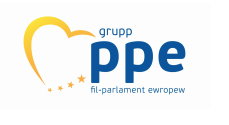 MEPs David Casa (EPP), Ana Gomes (S&D), Monica Macovei (ECR), Maite Pagazaurtundúa (ALDE) Stelios Kouloglou (GUE) and Benedek Jávor (Greens) have joined forces to push for EU legislation that will address and end “SLAPPs” – lawsuits intended to intimidate and silence investigative journalists and independent media by burdening them with exorbitant legal expenses until they abandon their opposition. According to the MEPs, the practice is abusive, poses a threat to media freedom and has no place in the European Union.
MEPs David Casa (EPP), Ana Gomes (S&D), Monica Macovei (ECR), Maite Pagazaurtundúa (ALDE) Stelios Kouloglou (GUE) and Benedek Jávor (Greens) have joined forces to push for EU legislation that will address and end “SLAPPs” – lawsuits intended to intimidate and silence investigative journalists and independent media by burdening them with exorbitant legal expenses until they abandon their opposition. According to the MEPs, the practice is abusive, poses a threat to media freedom and has no place in the European Union.
SLAPP was used, for instance, against investigative journalist Daphne Caruana Galizia and is now being used against Maltese media houses by firms associated with government corruption and the Panama Papers scandal that are threatening legal action in the United States. David Casa, Ana Gomes, Monica Macovei, Maite Pagazaurtundúa, Stelios Kouloglou and Benedek Jávor stated: “In Malta we have seen that firms like Pilatus Bank and Henley & Partners that employ these practices, using American litigation, have succeeded in having stories altered or deleted completely from online archives. And investigative journalists are prevented from reporting further on corrupt practices out of fear of further legal action. But this is not just a Maltese problem. In the UK, Appleby, the firm associated with the Paradise Papers, is using similar tactics against the Guardian and the BBC.
The cross-border nature of investigative journalism as well as the tendency to pursue legal action in jurisdictions outside the EU that only have a tenuous connection with the parties justifies and requires an EU response”.
The MEPs are calling on EU Commissioner Frans Timmermans to propose an EU anti-SLAPP directive that will include:
• The ability for investigative journalists and independent media to request that vexatious lawsuits in the EU be expediently dismissed and claim compensation;
• The establishment of punitive fines on firms pursuing these practices when recourse is made to jurisdictions outside the EU;
• The se]ng up of a SLAPP fund to support investigative journalists and independent media that choose to resist malicious a^empts to silence them and to assist in the recovery of funds due to them;
• The setting-up of an EU register that names and shames firms that pursue these abusive practices.
“We are committed to the protection of investigative journalists and media freedom across the EU and will pursue this issue until anti-SLAPP EU legislation is in place,” the MEPs stated.
Thomas Gibson from the Committee to Protect Journalists stated: “SLAPP is a serious threat to journalism and media freedom. These sums of money are in no way proportionate.
Independent journalists in Malta already face enormous challenges and restrictions. critical journalism must not be stifled. In addition to pushing for full justice of the murder of Daphne Caruana Galizia, the Commission needs to address the climate in which investigative journalists work in the country.”
Jodie Ginsberg, CEO of Index on Censorship, said: “Having a media that is free to investigate corruption and abuse of power – and free to publish the results of those investigations – is fundamental to democracy. These vexatious lawsuits – deliberately aimed at preventing journalists from carrying out such work – must be stopped.”[/vc_column_text][/vc_column][/vc_row][vc_row][vc_column][vc_basic_grid post_type=”post” max_items=”4″ element_width=”6″ grid_id=”vc_gid:1516372688389-8d5f3054-b08d-10″ taxonomies=”1682, 14259, 18781″][/vc_column][/vc_row]
[vc_row][vc_column][vc_column_text]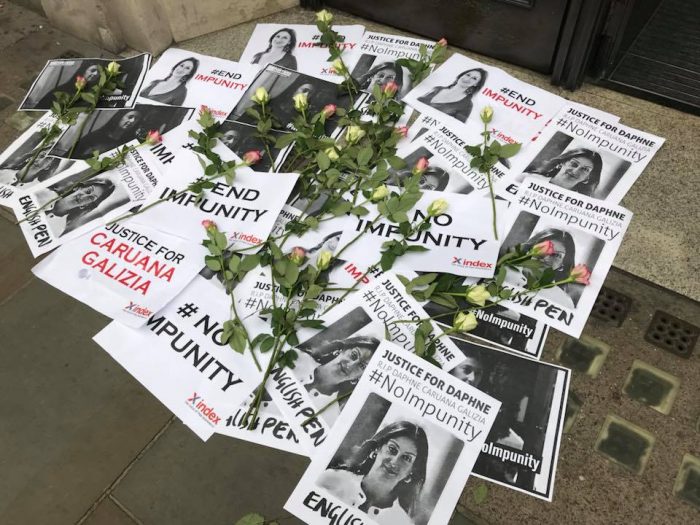 Doughty Street Chambers has surfaced concerns about the investigation being carried out by Maltese authorities into the death of Daphne Caruana Galizia, a journalist, writer and anti-corruption activist murdered on 16 October when her car exploded.
Doughty Street Chambers has surfaced concerns about the investigation being carried out by Maltese authorities into the death of Daphne Caruana Galizia, a journalist, writer and anti-corruption activist murdered on 16 October when her car exploded.
In its urgent legal advice to the family of Galizia, Doughty Street Chambers, an international specialist law firm, raised issues around the independence of the investigation, which they said was in a “clear and serious breach of Article 2” of the European Convention on Human Rights, which guarantees an effective investigation.
Doughty Street barristers Caoilfhionn Gallagher QC and Jonathan Price said “we are of the firm view that Malta is in flagrant violation of the Article 2 investigative duty and thus in breach of its obligations under the ECHR”, and that “from the information available at this stage it appears highly likely to us that the Maltese authorities have also violated other human rights of Ms Caruana Galizia and the bereaved family, under Articles 2, 3, 8, 10 and/ or 13 ECHR (and indeed under other international human rights treaties and domestic law).”
A further requirement of Article 2 is that the investigation should safeguard the legitimate interests of the next of kin. However, Galizia’s family members have been learning of key developments through grossly inappropriate channels: Twitter accounts belonging to politicians and news headlines.
“The advice from leading legal experts confirms that Malta is in breach of its obligations under European law to investigate the murder of Daphne Caruana Galizia thoroughly and fairly”, said Joy Hyvarinen, head of advocacy at Index on Censorship. “The advice raises extremely serious questions about the Maltese police, and Index believes that external, independent investigators must be appointed urgently.”
The lawyers called for swift action to be taken by the authorities in Malta to immediately remove the deputy commissioner from his role and to apologise to the family “for the failure to appropriately update and involve them in the investigation, and alter the way in which information is provided to them to comply with Article 2’s requirements.”[/vc_column_text][/vc_column][/vc_row][vc_row][vc_column][vc_basic_grid post_type=”post” max_items=”12″ style=”load-more” items_per_page=”4″ element_width=”6″ grid_id=”vc_gid:1512749485797-9de444c0-8566-10″ taxonomies=”18781, 18782″][/vc_column][/vc_row]
[vc_row][vc_column][vc_column_text]
The family of murdered journalist Daphne Caruana Galizia has issued a statement and a letter in response to Maltese minister Michael Farrugia’s publication of their private letter to him. The private letter reminded the minister of his legal responsibilities related to the investigation into the murder of Daphne Caruana Galizia. In the statement, the family says: “We were dismayed to see that the Minister of Home Affairs and National Security, Michael Farrugia, published our letter to him accompanied by a media statement. This was a private letter from the widower and sons of an assassination victim to their country’s minister who is responsible for the police and, ultimately, the assassination investigation.”
Index on Censorship condemns the minister’s actions. “This is a deeply discouraging development, said Joy Hyvarinen, head of advocacy at Index on Censorship. The Maltese authorities should be focusing on investigating the killing of Daphne Caruana Galizia, rather than engaging in a public fight with the grieving family.”
“We were dismayed to see that the Minister of Home Affairs and National Security, Michael Farrugia, published our letter to him accompanied by a media statement. This was a private letter from the widower and sons of an assassination victim to their country’s minister who is responsible for the police and, ultimately, the assassination investigation.
“It is inappropriate and irregular that the Maltese government publishes a private letter from citizens to the Minister responsible for their security, more so to send it to every media outlet in the country with an accompanying media statement. And it is inappropriate and irregular for the same Minister Michael Farrugia to ‘Tweet’ that statement and to have the Prime Minister re-Tweet it.
“We have responded in writing to Minister Michael Farrugia’s actions. As the widower and orphaned sons of an assassination victim killed on his watch, as private citizens, we would have preferred to deal privately with the concerns we have raised. As we now cannot be sure Minister Michael Farrugia will respect protocol and dignity and obligations of his office and not release our latest letter to him to the media, we have been constrained to do so ourselves, accompanied by our own statement.”
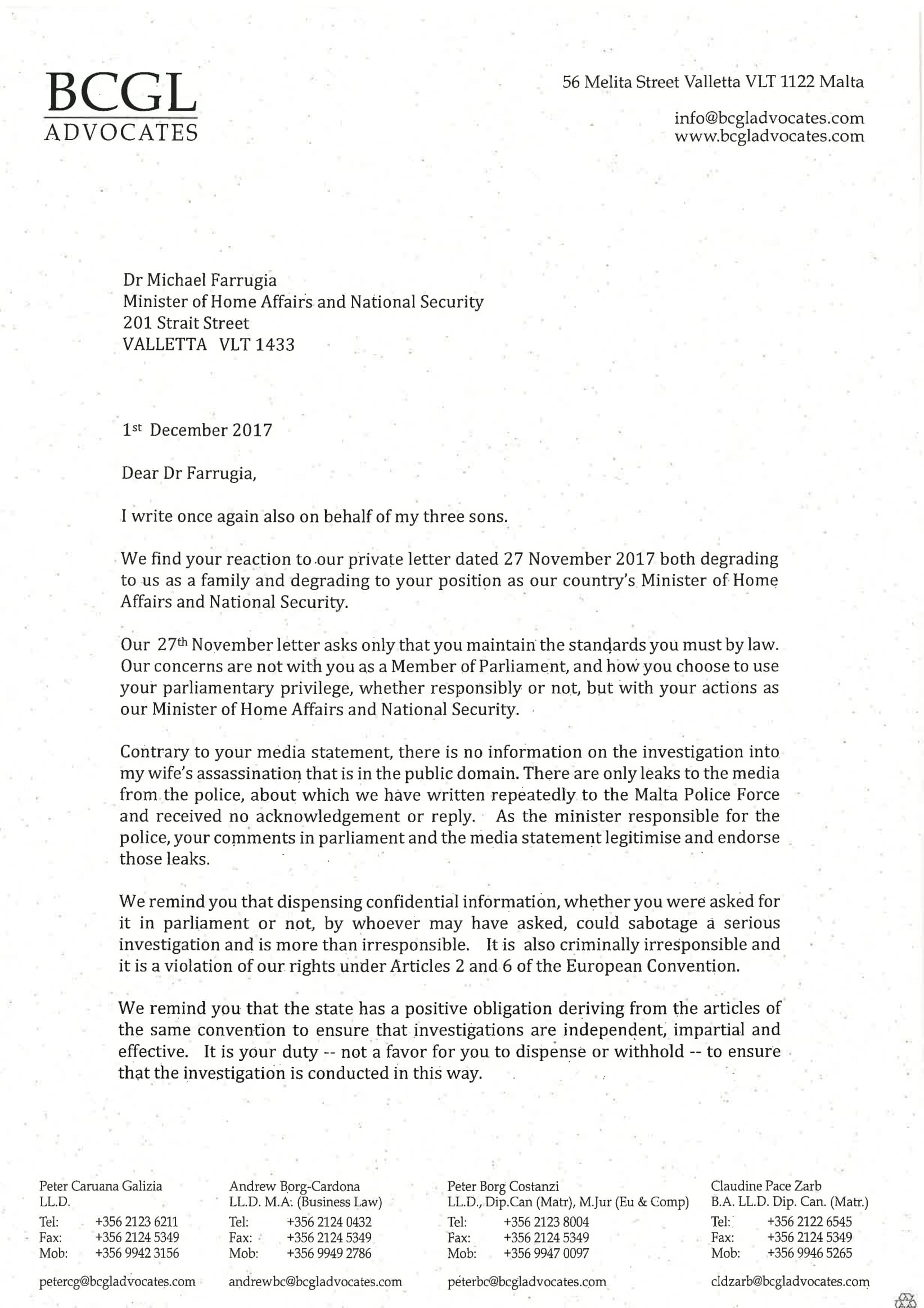
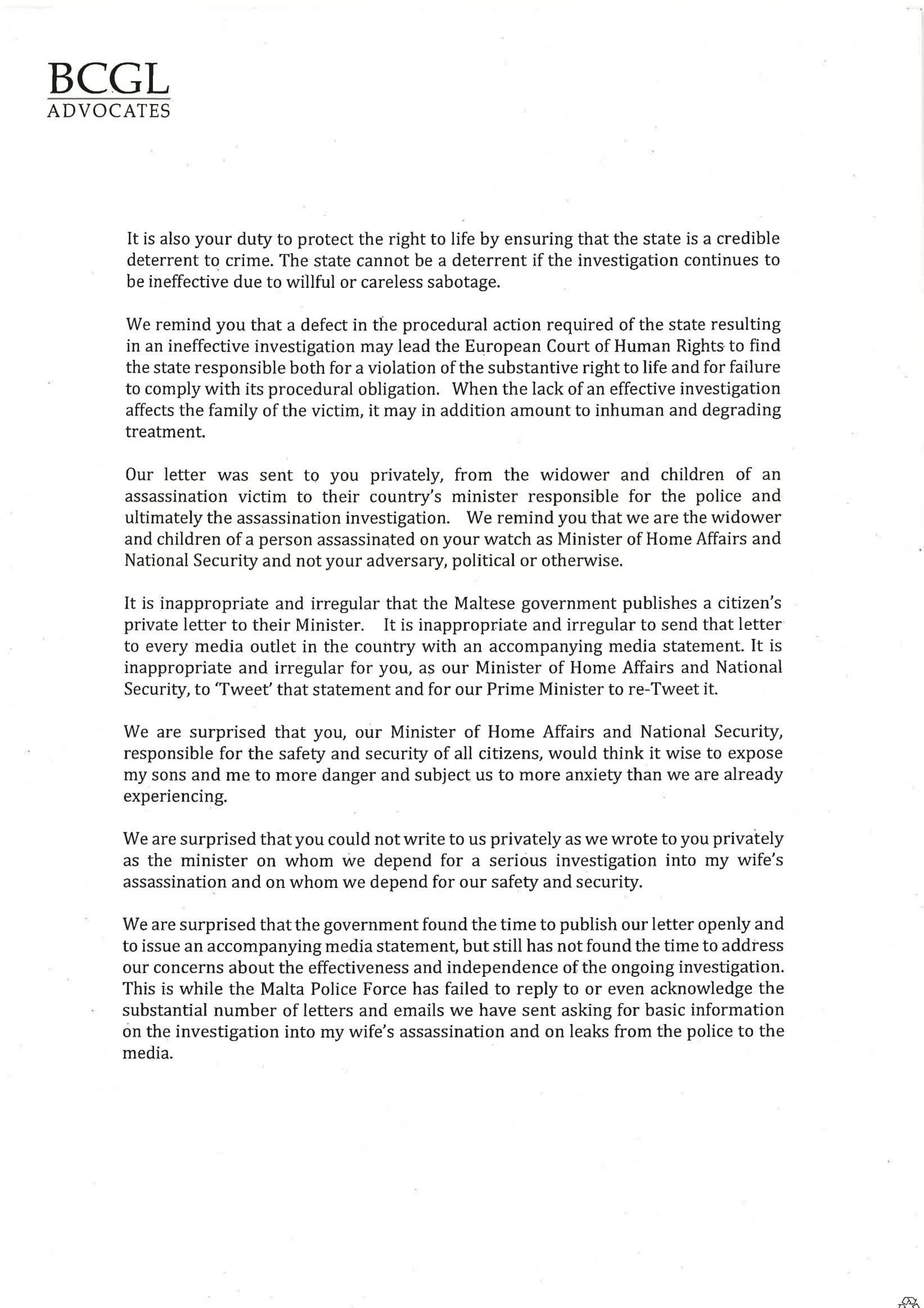
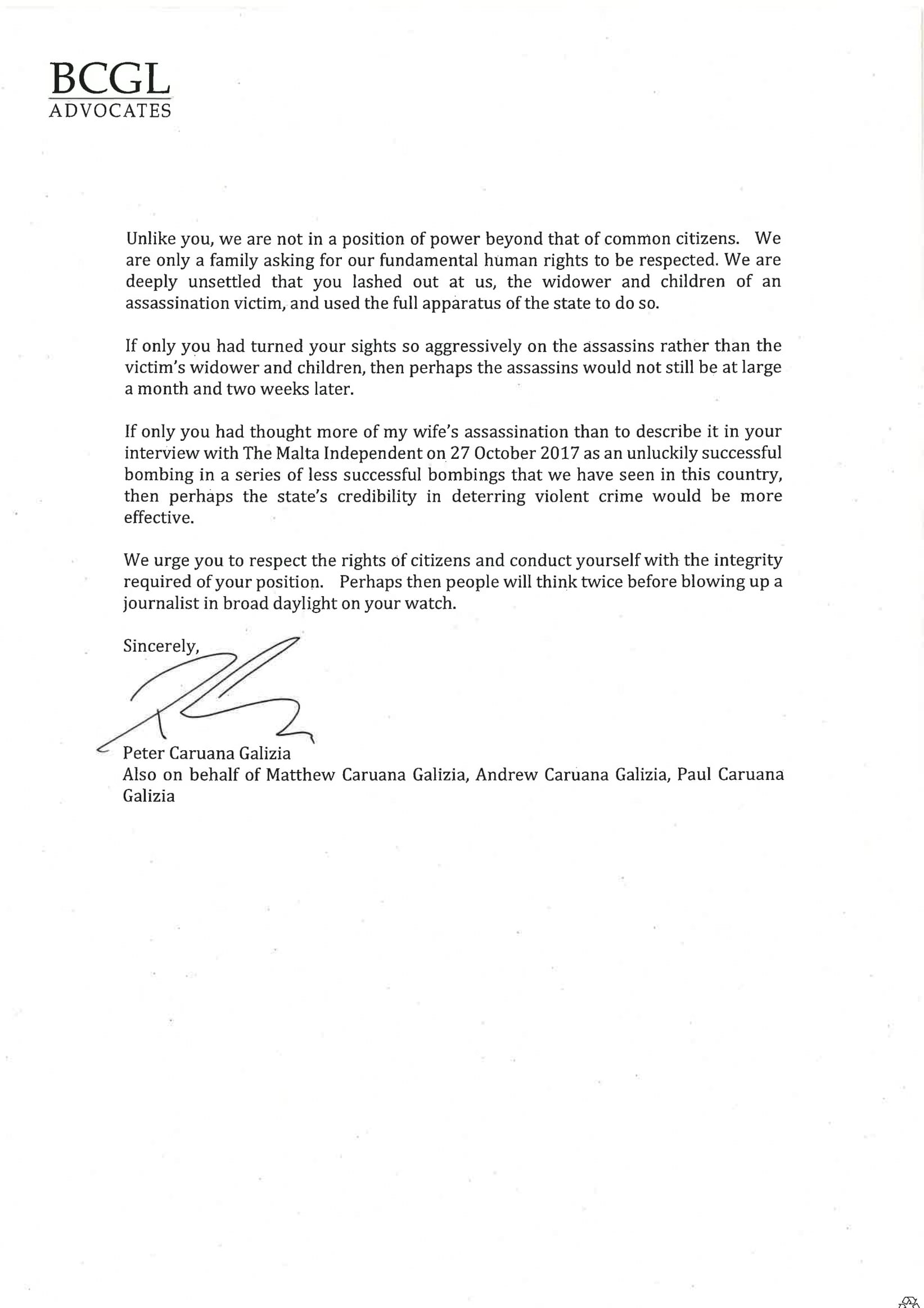 [/vc_column_text][/vc_column][/vc_row][vc_row][vc_column][vc_basic_grid post_type=”post” max_items=”4″ element_width=”6″ grid_id=”vc_gid:1512137999330-c98266d2-ed08-0″ taxonomies=”18782, 18781″][/vc_column][/vc_row]
[/vc_column_text][/vc_column][/vc_row][vc_row][vc_column][vc_basic_grid post_type=”post” max_items=”4″ element_width=”6″ grid_id=”vc_gid:1512137999330-c98266d2-ed08-0″ taxonomies=”18782, 18781″][/vc_column][/vc_row]
Maltese journalist Daphne Caruana Galizia was killed on 16 October 2017 when a bomb placed under her car exploded as she drove away from her home in Bidnija, in the north of the island of Malta. A specialist in investigating corruption, her work included exposés of the shady secret deals, uncovered in the Panama Papers, that show how politicians and others hide illicit wealth behind secret companies. Her allegations about government corruption led to early elections in the country last June.
Index on Censorship’s project manager for Mapping Media Freedom, Hannah Machlin, spoke with RTK, a Catholic radio station in Malta, about Caruana Galizia’s murder.